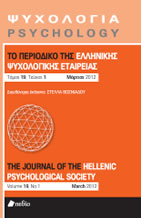Anxiety and depression among university nursing students: application of prevention programs

Abstract
This literature review aims to investigate Cognitive Behavioral Programs (CBT) that are applied worldwide and their effectiveness on the prevention of anxiety and depression in nursing students. In the first part of the review, the importance of studying these programs and their application in the nursing population are mentioned. Contemporary
research data on the prevalence of anxiety and depression in nursing students are examined and comparisons are made with studies looking upon general student population of the same age. Factors that
trigger or protect against the onset of these problems are presented. CBT programs are discussed, in relation to anxiety disorders and depression in relevance to the nursing population, while in the later section contemporary research findings of CBT programs that have been applied to nursing students are presented. The results of these programs show that there is a significant decrease of the anxiety and improvement of the students’ mood, which points to the importance of primary prevention in the academic environment in order to ensure students’ mental health and quality of life.
Article Details
- How to Cite
-
Παναγιωτοπούλου Α., & Α. Πασχάλη Α. (2020). Anxiety and depression among university nursing students: application of prevention programs. Psychology: The Journal of the Hellenic Psychological Society, 19(3), 281–295. https://doi.org/10.12681/psy_hps.23623
- Issue
- Vol. 19 No. 3 (2012)
- Section
- RESEARCH PAPERS

This work is licensed under a Creative Commons Attribution-ShareAlike 4.0 International License.
The journal PSYCHOLOGY adopts a Platinum open-access policy. Submission, processing or publication costs are waived by the Hellenic Psychological Society. Papers published in the journal PSYCHOLOGY are licensed under a 'Creative Commons Attribution-ShareAlike 4.0 International' licence. The authors reserve the copyright of their work and grant the journal the right of its first publication. Third-party licensees are allowed to use the published paper immediately after publication as they wish, provided they retain the defined by the license copyright formalities, regarding the reference to its author(s) and its initial publication in the journal PSYCHOLOGY. Moreover, any adjusted work should be shared under the same reuse rights, so with the same CC license.


